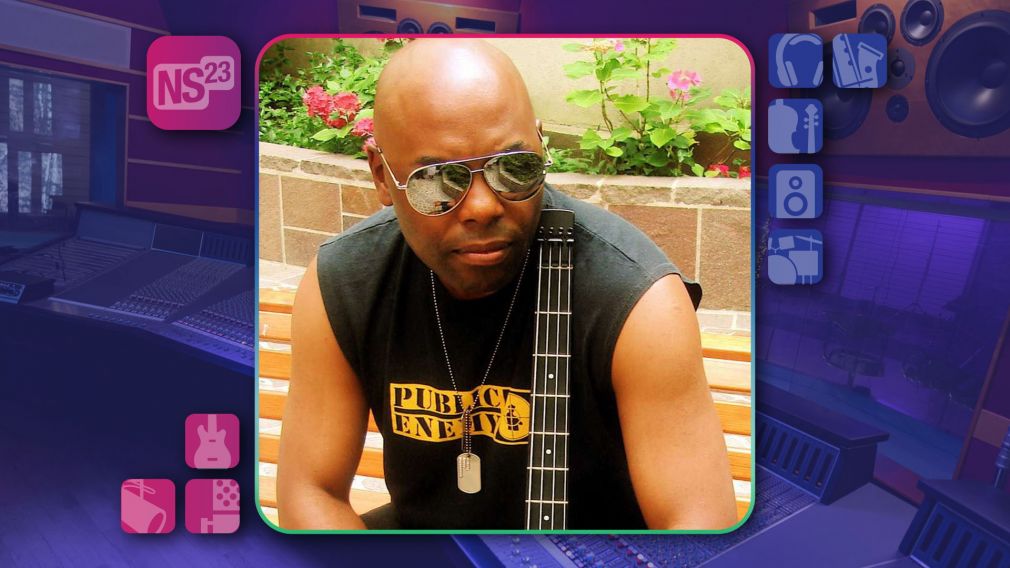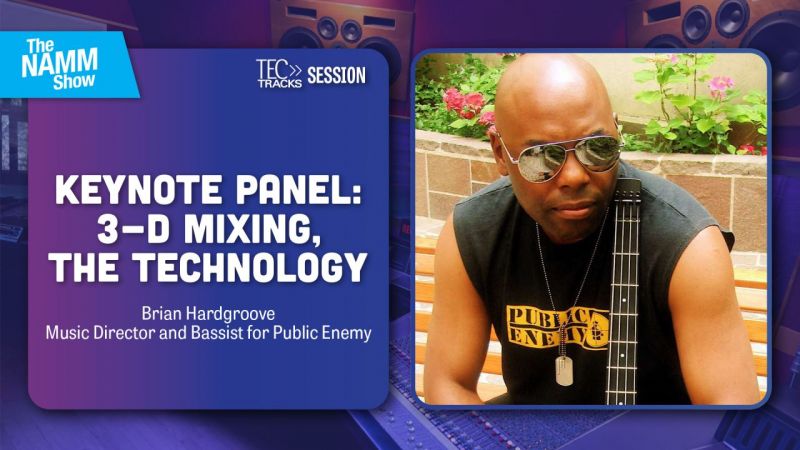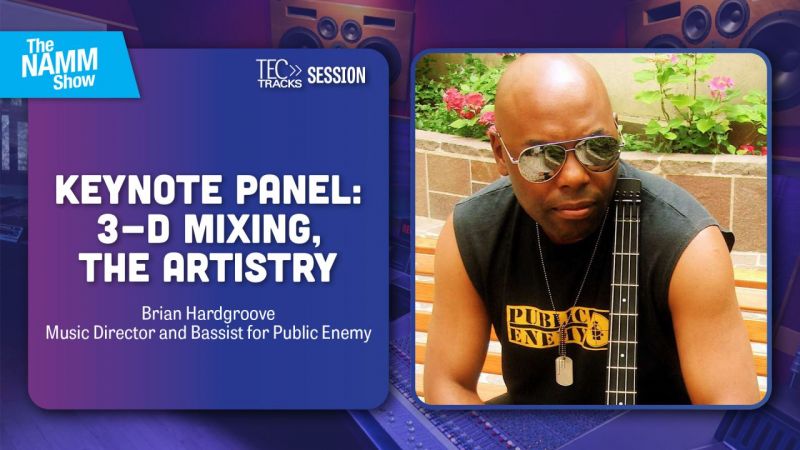Behind the Scenes With Brian Hardgroove

Many people know Brian Hardgroove from his years as the bassist, performing and recording with Rock & Roll Hall of Fame inductees Public Enemy (PE). However, few realize he was a consultant for a major suite of recording studios in Midtown Manhattan, appropriately named Manhattan Center Studios.
Hardgroove likes to create situations where everyone wins. Nowhere is that more apparent than at The 2023 NAMM Show, where he has played a significant role in developing several noteworthy exhibits, presentations, and performances. Though Hardgroove keeps a low profile, NAMM is already witnessing the impressive results of his creative vision. That vision, combined with a stellar reputation, makes progressive industry manufacturers want to work with him and co-develop opportunities for the greater good.
So, what is Hardgroove infusing into this year’s NAMM Show? He conceptualized the idea for the Impact Music & Culture Award, which recognizes musicians who have made extraordinary cultural and humanitarian contributions. The Impact Music & Culture Award will be introduced at the TEC Experience on Thursday evening and will be presented to Public Enemy’s Chuck D.
In addition, Hardgroove and The MIDI Association are also shaping The NAMM Show’s Hip Hop 50 celebration, shining a NAMM Show spotlight on the world’s most popular music genre. To keep that conversation at a high level, Hardgroove, The MIDI Association, and Black to the Future will present “Chuck D on Hip-Hop at 50,” a showcase and historical look at the American music and cultural phenomenon. Hardgroove will also interview original Living Colour bassist Muzz Skillings in a session focusing on the extraordinary impact of the band’s debut and sophomore albums, Vivid and Time’s Up.
This year’s TEC Tracks sessions, always a NAMM Show favorite, will make a big splash into immersive audio with Hardgroove moderating two keynote panels: The Technology of Immersive Audio and The Artistry of Immersive Audio.
Why Hardgroove and not a pro audio superstar, you might ask?
Hardgroove says, “The immersive audio sector will grow through artists’ adoption, not from the will of manufacturers or engineers. Artists need exposure to affordable tools that will allow them to envision and mix their music in color [3D] versus black and white [stereo].”
Owing to his long and productive relationship with Sennheiser, there will be an immersive demo room in ACC North, the Neumann Immersive Soundstage Experience, where 3-D mixing and playback will be demonstrated and discussed by many of the music industry’s leading innovators.
A busy man? What an understatement! Much of Hardgroove’s success can be credited to his “let’s do it” attitude. He also has a talent for hatching good ideas quickly. He seems to be everything and everywhere all at once. What really makes him tick?
As a young person, what was the first music that you connected with?
Nationwide hits were the most prevalent on the radio stations I listened to. WABC was a popular station in the New York City metropolitan area. Acts that aren’t talked about much anymore were highly influential. Sam Cooke, Sam & Dave, Lulu, The Association, Martha & The Vandellas, The Young Rascals, The Cowsills, Brooke Benton, The Mamas & the Papas, Wilson Pickett, and many more.
What was it like growing up in Queens, essentially having a front-row seat to the invention of hip-hop?
In retrospect, it was powerful to witness this new ‘rap music’ grow, even as it was attacked and minimized by most of America, including some of Black America.
Why did you pursue a career in music?
Once I experienced the impact of Earth, Wind & Fire live in concert, I began to realize my goal to become a policeman - noble though it may have been - would not be as impactful as being a popular musician with a message.
What was your musical education and when did it occur?
I survived a completely uninspiring music education in high school. After graduation, my education came directly from neighborhood musicians that were recording and traveling professionally at the time.
What musical genres were/are you most drawn to and why?
I’ve never been drawn to genres. I’ve always been attracted to messaging, rhythmic, and harmonic depth.
What changed for you once you became a serious musician?
To this day, there has never been a specific ‘I’m a serious musician’ moment for me. However, once I began to appreciate record production, my focus shifted to creating musical entities that would promote messaging I believe in.
How did you connect with Public Enemy, and what was it like joining the band?
Chuck D had a label deal with Columbia Records in the early ‘90s. Singer Kyle Jason was on the label. As I understand the story, Kyle sought a bassist to join his touring band to support a Frankie Beverly tour. He reached out to the president of The Black Rock Coalition to get my number after seeing me perform at a club near his home. As I continued to work with Kyle, Chuck got a glimpse of my work ethic.
Eventually, Chuck and I decided to work on an album together. We named our collaboration The Fine Arts Militia. After a handful of successful shows and an appearance in Martin Scorsese’s Lighting in a Bottle, Chuck asked me to join Public Enemy as the bassist and bandleader. Chuck asking me himself was both surreal and completely logical, given what we’d already worked on and where he was looking to take Public Enemy.
What do you remember most about going on the road with PE?
The most important takeaway from touring with Public Enemy is how powerfully Chuck’s message resonated with people from all walks of life.
What are you most looking forward to at this year’s NAMM Show?
Inspiring musicians to create with new tools in the hope that a new generation of positive writers, singers, and performers find their voices.
Any advice for up-and-coming artists to survive and prosper in the music industry?
Pay attention and be willing to pay your dues, not someone else’s concept of dues. The music ‘business’ is inherently unfair to composers and performers regarding financial compensation and access to one’s own creations.
Understanding the similarity between banks, record companies, and live concert promotion consortiums is critical. Artist agreements with these large organizations are more restrictive than they’ve ever been. Choose your associations and teammates wisely.
If you’re willing to go into a legal agreement, make sure you are trading your services for the return you desire, not for some universally accepted standard. This advice applies to the musicians you choose to work with, as well. Do not let anyone waste your time! Time is truly the most valuable thing we have to offer.
Registration for The 2023 NAMM Show is now open at https://registration.namm.org.

